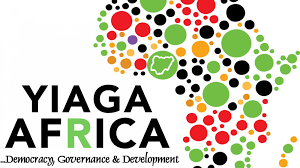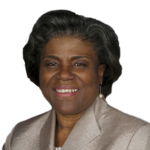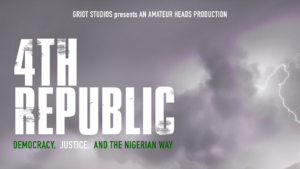Nigeria’s politics remains an “old men’s club,” former US diplomat Linda Thomas-Greenfield told this week’s forum (above) organised by the National Endowment for Democracy in partnership with the Ford Foundation and YIAGA Africa, The former assistant secretary of state  for African affairs said Nigeria’s democracy had the benefit of five positive trends or factors:
for African affairs said Nigeria’s democracy had the benefit of five positive trends or factors:
- Institutional infrastructure, including “parties that sometimes work. No other African state state rivals Nigeria’s capacity to support the democratic process.
- Committed voters, who have shown a willingness to sacrifice time and lives, in election turnouts that shame many established democracies.
- A young population, with a median age of 17, eager for political participation.
- The financial means to pay for elections, even if money is sometimes used to influence election results.
- A proactive and effective civil society, of which YIAGA is a case in point.
 But Nigeria also faces several critical challenges, said Thomas-Greenfield (right), including:
But Nigeria also faces several critical challenges, said Thomas-Greenfield (right), including:
- Youth and women’s participation is too low, despite the best efforts of the Not Too Young To Run campaign. Politics is still an old man”s club as would-be candidates need “anointment by the godfathers: who control the money.
- Ethnic and regional cleavages: the North-South alternation “worked until it didn’t” and it hasn’t served the interests of Nigeria’s people
- Systemic corruption stifles economic dynamism. In Transparency International’s Corruption Index, Nigeria is 144th of 180.
- Elections are too expensive to run – for the candidates who need to buy votes – a reversal of the US system where voters fund the parties. It’s a prohibitive barrier to entry for political participation, especially for youth and women.
- Potential for electoral violence: the 2019 poll was “a huge step backwards.”
 While Nigeria has made strides in its democratic development, the 2019 elections were a step backward for Africa’s most populous country and biggest democracy, the U.S. Institute of Peace adds:
While Nigeria has made strides in its democratic development, the 2019 elections were a step backward for Africa’s most populous country and biggest democracy, the U.S. Institute of Peace adds:
“4th Republic,” a new Nigerian political thriller directed by Ishaya Bako, interrogates the systemic problems at the heart of Nigeria’s democratic development. Following a fictional gubernatorial candidate who challenges the incumbent’s victory and investigates corruption allegations, the film explores the role of women in politics, the influence of patronage systems, the impacts of electoral intimidation, and the irregularity of the judicial system in Nigeria.
Join USIP and the Open Society Foundations on November 19 for a screening of “4th Republic.” As part of efforts to improve governance and address election-related violence in Nigeria, the film will be preceded by remarks from keynote speakers about Nigerian democracy today and its future trajectory.
Date: Tuesday, November 19, 2019. Time: 5:00pm – 8:30pm RSVP
Location: U.S. Institute of Peace, 2301 Constitution Ave, NW, Washington, DC.







